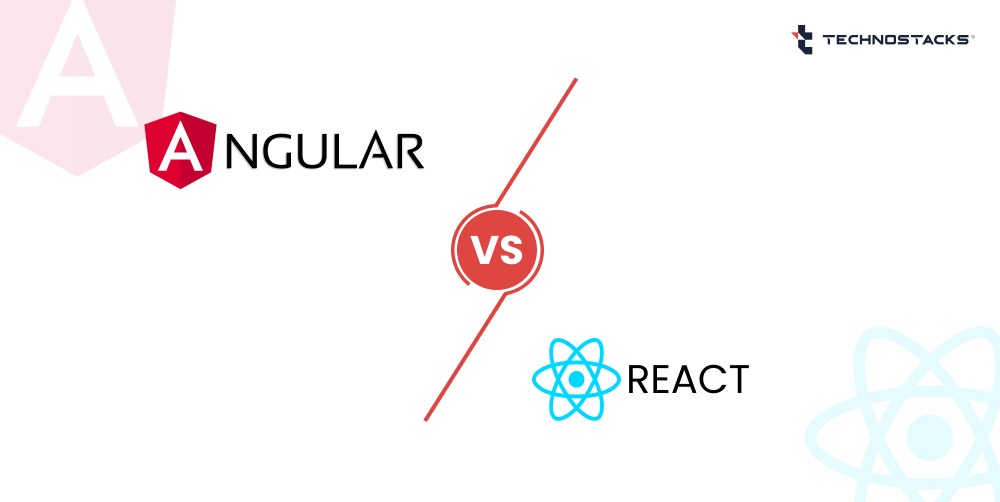React vs Angular: Which Is A Better JavaScript Framework?
If you are into designing web applications, deciding the Best JavaScript frameworks can be a tedious and overwhelming task. React vs Angular is the trending topic in 2025. These two frameworks come from a lineage of two powerful competitors – Google and Facebook. React has already established itself in the industry but Angular is relatively new to the game. The performance of React vs Angular is often debated upon.
Frameworks and libraries are distributed with different licenses. There are some licenses which are somewhat flexible and allows for adjustments according to the requirements. They are known as open-source products and there are other licenses which do not allow for the designing of commercial applications or the flexibility of editing the content after its creation.
Both Reactjs and Angular are open-source products and when it comes to the popularity of React vs Angular, both are used by major brands.
You can see here the Google trends comparison graph of Angular vs react.
Yes! You can see here the result. In Google trend comparison, react is a clear winner and will be more popular in 2025 than Angular.
Before you even move even a step ahead, it is suggested to glance through the synopsis of the Angular Framework and the React Library to decide on your next project.
Check here the comparison of both angular and react.
| Technology | React | Angular |
|---|---|---|
| Usage | It is used for setting up needed processes and introducing to the quality standards for preventing the errors and flaws in an app. | It is used for identifying and correcting the bugs as well as errors. |
| Company | ||
| Category | Open source JS Library | JavaScript framework |
| Toolchain | High | High |
| Language | JavaScript, JSX | TypeScript |
| Learning Curve | Easy to understand the framework and takes significantly less time to set up a single project. | Angular is not simple due to its inherent lack of understanding of the framework and is very complex. |
| Packaging | Strong | Medium |
| Architecture | React.js architecture is simplified; it follows a Model-View-Control (MVC) architecture. | Angular architecture is a bit complex; it follows component-oriented architecture. |
| Data Binding | It uses unidirectional data binding, which connotes data flow in only one direction. | It uses bi-directional data binding, which helps write less code. |
| DOM | Virtual DOM | DOM, Regular |
| Last Version | 18.2.0 | 14.2.7 |
| Purpose | React library resolves only specific run-time errors since it has certain designed functions. Herein, developers can set up standards of quality and adequate processes to prevent flaws in an application. |
Angular is quite helpful in detecting execution errors at an early stage. This is because it includes unit tests aiming to detect the mistakes independently. |
| Performance | One of the main hurdles with the react library is its performance. To determine the modifications in the actual DOM, it is necessary to have a replica of the DOM in memory at all times. |
Angular is highly managed to combat the react.js performance. Furthermore, it is based on the “Dirty Checking” approach to reducing the negative performance effects. |
| Language | JSX syntax for learning. | TypeScript + RxJS as additional feature to learn. |
| Testing | More than one tool is needed for testing an entire project in React. | A single tool is needed for testing an entire project in Angular. |
| Directives | React framework doesn’t include any directives; hence, all template logic should be written by itself. | Using directives in Angular is an effective way to work with DOM. |
| Commonly used for | React framework is used in web applications, hybrid apps, and native applications. | Angular is used in mobile apps and single-page applications. |
Let’s see more about Reactjs and Angular.
About React
React was released in 2013 by Facebook. It supports JavaScript languages and renders both client and server-side data. Its architecture is component-based and follows a one-way data binding technology. Its DOM is virtual however its learning curve is relatively low.
Advantages of React:
- React allows you to use HTML codes as it comes forward with JSX. You can practice HTML tags and syntax for rendering subcomponents.
- It offers the ability to compound the components of the app in a single time file, and it also promoted the development of machine-readable programs.
- React comes with an ideal setup for app developers and it had led to a large number of developers using React Native for application development.
- React has a prompt rendering feature that gives it a slight edge over the Angular JavaScript. It consists of various approaches to lessen the amount of DOM operation and thereby speeds up the updating process, making it more efficient.
- React has a Virtual DOM which can help developers manage an extensive database.
- React is a purely JavaScript based library product. A primary difference is that Angular is a subset of HTML and React is not.
- React is a choice that you make when you are looking for reliable, intensive and straightforward programming. It is a relatively more advanced language than Angular.
Read More: Best React Component Libraries
Disadvantages of React
- A traditional MVC framework like Rail needs configuration and integrating Reactjs into it slows down the development time and process.
- If you combine the advantages and disadvantages for React, you will see that the framework might be suitable for specific applications and not work for the rest. Every app is different.
When to use React?
When there is a lot of dynamic content in your application that is when React would be the right choice. Many popular brands like Instagram and Facebook prefer to use ReactJs to base their mobile apps on because of its dynamic nature.
Sometimes, adopting React may make sense over using Angular and vice versa. Here are a few brands which have used Reactjs: Uber, Dropbox, Netflix, Instagram, PayPal, and Flipkart.
Read More: React vs Vue: Which Framework to Choose?
Features of React
1. Virtual Document Object Model (DOM)
The document object model (DOM) treats an XML or HTML document as a tree structure, with each node representing a section of the content. React’s simplified Real DOM is called the Virtual DOM. This scenario is because only that particular object in the real DOM is updated when the state of an object changes. The manipulation of the real DOM is much slower than the manipulation of the virtual DOM.
2. JSX
A syntactic JavaScript extension is JSX. This phrase is used in React to describe how the UI should look. By using JSX, you can write HTML structures in the same file as JavaScript code.
3. Architecture
React is the precise “View” in an explicit Model View Controller (MVC) architecture, which determines how the app appears and functions. You can use the application’s UI logic view and leverage the model for all data-related reasoning. On the other hand, the controller works as a straightforward interface between the model and the view. Model, View, and Controller are the three components of the application layer according to the MVC architectural pattern.
4. Data Binding
React uses one-way data binding, so all operations remain quick and modular. Furthermore, while creating a React project, it’s typical to stack child components inside parent components due to the unidirectional data flow.
5. Extension
React is more than merely a User Interface (UI) framework; it has many extensions that address every aspect of the application architecture. It offers server-side rendering and aids in the development of mobile applications. React may be prolonged with Redux and Flux.
About Angular
Angular was initially released on 14 September 2016 by Google. It is a typescript based web application framework.
It is completely different from AngularJS which is javascript based front end development framework. However, Angular is a complete rewrite from the same team that built AngularJS.
Angular follows both one-way data binding and two-way data binding structure.
Angular is frequently updated its features and releases. Now, Angular 7.0 is the latest version. You can check here for the updated Angular version releases.
Advantages of Angular
- Angular is known for its community and developer support services. Angular has brought in a rise in demand for its framework because of its support factors.
- The Angular framework runs on all browser environments regardless of its platforms.
- Angular has established itself as a reliable framework because it includes off-the-rack tools and it also has robust components which are evolved in Juxtapose.
- Angular comes with a Bi-directional data binding feature that is, in fact, the primary difference between Reactjs and Angular. It disperses influence after every set of data changes.
Disadvantages of Angular:
- Angular does not consist of extensive, all-inclusive documentation or a clear manual.
- It also has a steep learning curve which is one of its main drawbacks.
Read More: Best Frontend Frameworks
When to use Angular?
When you require your app to be compatible with all the browsers that is the best time you use Angular. It even helps your app consistent with browsers older than the IE8. There has also been a recent release of the Angular 14 in the market and it has undoubtedly attracted a lot of attention from developers especially with its performance boost features and server-side rending support services. If your mobile application lies between the complexities of low to medium, Angular is the best way to go.
Some of the popular brands using Angular are: NASA, HBO, Nike and YouTube.
Features of Angular
1. DOM (Document Object Model)
The document object model (DOM) treats an XML or HTML page as a tree structure, with every node signifying a different section of the dynamic content. Angular uses regular DOM. Consider that the exactly equal HTML page has undergone ten revisions. Angular will update the entire diagram of HTML elements instead of just those that have changed previously.
2. Typescript
Users can write more understandable JavaScript code using TypeScript, which defines a set of types for JavaScript. Because of JavaScript compilation, any framework can easily handle the smooth running of TypeScript code. Leveraging TypeScript is not vital to building Angular applications.However, it is still strongly recommended because it offers a unique syntactic structure while turning the codebase simpler to comprehend, sustain, and maintain.
3. Data Binding
Through data binding, users can control many parts of web pages. It integrates dynamic HTML rather than complex scripting or programming, and Web pages containing interactive elements such as calculators, tutorials, forums, and games necessitate data binding. It also allows web pages with a large amount of data to be showcased more successfully, little by little.In Angular, you can use two-way binding. You can convey the changes to the affiliated User Interface components in the model state. On the other hand, you can better represent changes to the model state right in the UI. Thanks to the controller, the framework can now connect the DOM to the model data.
4. Architecture
A complete model-view-controller (MVC) framework is Angular. It includes bi-directional data flow while providing real DOM and specific directions on how to organize the application.
5. Testing
The testing framework Jasmine is used by Angular. The Jasmine framework provides numerous features and functionality for creating various test cases. For example, Karma, the test task-runner, configures the start-up, journos, and testing framework in a config file.
Which Are Differences between Angular and React?
1. Backward Compatibility
Angular 4 is backward compatible right with Angular 2 and further. The different versions that are below Angular 2 are not fully backward compatible. This is one of the disadvantages of Angular as a JS framework. On the other hand, React 16 is entirely backward compatible with preceding versions and even comprises support for asynchronous rendering. It’s also totally open-source and licensed right under MIT alongside GraphQL as well as Jest. Angular 2 is not backward compatible with AngularJS.
2. Ecosystems
Angular and React.js come with strong ecosystems. React is simpler to grasp; however, it needs numerous integrations such as Redux to use the perspective completely.One more thing or stuff to consider is that as React is a library, you can integrate it into any of the diverse projects, also if the project is developed in Angular.
3. Community Support
React has increasing and most incredible popularity amid developers on NPM and GitHub. React has more than 197k stars right on GitHub, which converses its popularity as a framework specially built for the developers’ community. But even Angular has got good community support. A survey highlighted that around 75 % of the React users would utilize it again for different projects.React has an outsized community base for the reason of Virtual DOM implementation. With Virtual DOM, the apps can be updated and rendered swifter than Angular applications. However, Angular has been supported by and used comprehensively by the apps built by Google, like Google AdWords.So, both frameworks have significant community support on most of the platforms. Community support assists you in solving any issues that you may face across any particular project.
4. Market Share
There is no doubt Facebook and Google have not built React and Angular just back the developers across the globe. They have also developed or supported them to run their own applications and websites on these particular systems. The platforms Instagram, WhatsApp, and Facebook itself are enabled by React, while most of the Google services are managed to utilize Angular.Even there are many other leading companies other than these IT giants who use these platforms. There are really big numbers. For example, amongst React.JS companies, one can find the New York Times and Netflix, to name a few. Captivatingly, codeacademy.com, which is an accepted website committed to teaching other people to code, is also utilizing React to enable their web applications.Angular, on the other side, is utilized by leading companies like Microsoft. That should not be that astonishing as TypeScript itself has been built by the creators of Windows. The giant Microsoft utilizes Angular to facilitate its Office’s and Xbox’s sites. Amid other Angular companies, one can find Forbes, Delta Airlines, and Santander Bank.
Aspects to consider when choosing between React vs Angular
1. MVC Pattern
Dividing the application into distinct and easily modifiable elements make it easier to reduce the line of codes, and in the end, it increases the quality of the result of the product. React only has the view component of the MVC which can increase the line of codes but Angular is developed according to the MVC architecture.
Read More: React Best Practices For Developers
2. Templating
There are various templates used to create UI. When you are developing a JavaScript product, you would want to take advantage of them. React makes use of the templates in the JSX file whereas Angular uses templates in the TypeScript file.
3. Data Binding
Data binding is a feature that helps you establish a connection between the UI and the business logic of the app. React implements a one-way data binding whereas Angular uses a two-way coupling which lets the framework connect the model data to the DOM via the controller. This affects the performance of the app. However, in React, when the data is directed only one way, debugging the app of errors becomes more natural, especially for applications that are quite large.
4. Rendering
You can render data is two ways – client side and on the server side. Delivering through the client side inversely affects the page loading time. Therefore, it is suggested that use a framework that provides data through the server side. Both React and Angular use server side.
5. Performance
Since React has a one-way data binding, it does not influence the performance when you try to develop complex applications. When you use Angular, you face this issue of the app performance. Additionally, Reactjs application developers have added a built-in virtual DOM feature that lets the server save a light ‘DOM tree’ which leads to less loading time on the browser.
Aspects to consider when you are determining the performance between React vs Angular
1. Packaging
It is all about the flexibility and capability of a developer to deploy a code the way you want it to run. If you want to achieve a faster loading time, developers much first aim at loading the minimum number and then continue when its demand increases. This gives you the ability to develop features without degrading the loading time.When it comes to React vs Angular, React allows developers to make the best use for slower loading pieces of code. Its library also enables working with solutions like web pack. Angular offers a limited ability to control the packaging, and as a result, it ends up looking like assembly code. Thereby, Angular is comparatively more rigid. So, while dealing with packaging, React is better.
2. Learning Curve
Angular has a steeper learning curve compared to Reactjs and so, it is not easy to master. If you are a professional developer, this will be easier to understand. Angular has a complicated lifecycle, and you need to deal with its unintuitive link and compile it. React on the other hand has a lower learning curve and takes lesser time for developers to understand its one-way data flow. Its library has very few lifecycle methods and you hardly ever have to read it. So, regarding the learning curve, React is better.
Read More: Best React Chart Libraries
3. Model Complexity
Model complexity means how you would structure your app data model when it is represented by the view. When it comes to this, Angular is considered quite sensitive when you deal with its scope because of its copy and compare feature. This means that it will restrict you from using large app models. However, the outcome will come with an advantage of making the code testable and simple. React gives you the option to choose without impacting the performance of the app. So, regarding model complexity, both React and Angular are good.
4. Reuse of Code
React lets you manage your app code as you like but Angular consists of a series of ready to use elements. Even if it has priority collisions and namespaces, Angular is always prepared to employ more elements. So, regarding the reuse of code, Angular is much better.
5. Templating
Templates are mostly termed as building blocks of mobile apps. They have a lot of customer information and flows that are developed with the app’s built-in, ready-made blocks. However, they are not reusable. So, regarding templating, Angular is better.
Angular Vs React – Which is the Best for Your Next Web Development Projects?
Let’s explore the variances and popularity of React vs. Angular.
React, a powerful user interface library created and maintained by Facebook, is on the precise corner. Examples of apps built with React include Netflix, Instagram, and Facebook. However, despite the considerable functional overlap, Google and Facebook’s respective technologies differ.
React is a precise library, while Angular is an explicit framework. React is commonly used to develop UI elements for any app with frequently changing data. In contrast, Angular is used to create complex enterprise-grade apps such as single-page and dynamic web apps. Although React programmers desire unidirectional data flow, Angular programmers favor two-way data binding.
React.js is the best choice if you are developing a single-page website. But if you are building a complex project, you should go for Angular. Because of Angular’s massive number of constructed functions and React’s smaller package size, the former has a steeper learning curve.
However, if you are still not sure between them, please get in touch with us at Technostacks, and we can discuss your current or upcoming projects.
Our technology specialists are able to assist you in making the best preference based on your business needs and requirements, as well as find the best professionals for your project. Whether you need a development team, project managers, or other technology experts, we can offer you topmost professionals with proficiency in your domains and the project or solutions you need to implement.
Key Takeaways
Both Angular and React are equally useful for writing applications. But they are entirely different frameworks to use. Some programmers may say that Angular is superior to React and vice versa. What’s in actuality best for an in-hand project is the way you utilize these frameworks.
Working with React seems a slight simpler at the starting point, as you write old-school JavaScript and use more HTML around it. However, there are many added tools you will have to take hold of like Flux. On the other hand, Angular works differently around HTML with a more organized approach. That’s why we may see typical and diverse syntax that looks debatable at initial sight. However, once you get familiar to Angular, you will surely get assistance from its unique and powerful features.
If you are planning to build a React and Angular web application then you can contact us, mail us info@technostacks.com, or call us on +919909012616. We have an expert team of web developers who are able to satisfy your needs and give appropriate answers to your query.
FAQs on the Difference Between React and Angular
1. Which framework is best in 2025? React or Angular?
We have checked the above Google trends comparison for both frameworks and noted that React has more popularity than Angular. Also, from the reviews of the expert developers’ community, we can say that React will be the best choice for 2025.
2. Which is better: React or Angular?
You should decide on the Angular framework when building a large-scale application with numerous features as it offers a scalable and trustworthy framework.
On the other hand, if you need to build single-page, light, and cross-platform apps effortlessly, extending an application’s present abilities in a shorter time span, React is the better option.
3. Is Angular better than React?
If your website needs to integrate complicated functionality like progressive, single-page, and native web apps, Angular is preferable over React. React, however, is a tool that excels at building UI components and can be applied to any application, even single-page apps.
But from the perspective of virtual DOM implementation and rendering improvements, React is superior to Angular. Version migration in React is also straightforward; unlike Angular, you don’t have to install updates one at a time. So, React offers programmers access to an extensive series of pre-existing solutions.
4. Is Angular easier than React?
React is more straightforward to understand than Angular and offers more work chances if you are a newbie or junior developer; thus, I advise you to start there. React has a much simpler and more explicit learning curve than Angular because it is a minimal UI library. It would be better to explore and learn a few things, such as JSX, a router library, and a state management library.
5. Is React taking over Angular?
Because of its virtual DOM implementation and rendering enhancements, React is better than Angular. React’s version migration is also effortless; unlike Angular, you don’t have to update software one at a time. Since it enables programmers to maintain the logical component of an app while only altering the view, it is helpful in mobile development.
Self-contained components make for simple maintenance and improvement. Most of the leading frameworks accessible at the time, particularly AngularJS, were quickly overpowered by React as it cleaned the complete marketplace with its competitive functionalities.
6. Is React or Angular more in demand?
On Facebook, React is far more popular than Angular is on Google. So compared to Angular, you have a lot more freedom here. But because React only has one view and requires you to handle the model and the controller, it is not appropriate to construct an MVC design.
7. Should I study React or Angular?
We concur because both Angular and React are excellent options for single-page websites in light of the above distinctions. However, Angular is an ideal choice to work with if your project is vast and has several validations, routings, and dependencies because you can quickly test the code.
8. Is Angular the same as React?
Angular is a comprehensive framework, whereas React is “just” a library. While Angular uses the real DOM and two-way data binding, React.js uses the virtual DOM and one-way data binding. Additionally, the speed of React is faster, and the size of React’s bundle is smaller (React works a bit faster).
9. Is React a good choice for front-end development?
One of the most known and often leveraged libraries for front-end development is React, which is not a framework. However, React is one of the essential front-end libraries you may use in modern JavaScript programming. So, yes! React is a good option for explicit front-end development.
10. Is React faster than Angular?
Angular is bigger and has longer load times on mobile. React is comparatively smaller, so it is faster than Angular.
11. Should I learn Angular or React in 2025?
If you are looking precisely at the present job market and development projects’ point of view, you should explore and learn React for front-end development, and you can choose Angular for complex web applications.
12. Is Angular faster than React in performance?
React.js utilizes virtual DOM; on the other hand, Angular 2 works on real DOM. As virtual DOM enables us to update the alterations without rewriting the complete HTML doc virtually, it helps updates to be faster and makes sure of swift performance without considering the overall apps’ size.
13. As a fresher, which framework should I choose: Angular or React?
Angular is a comprehensive full-blown framework, so a fresher requires learning many things such as TypeScript that are too in-depth. On the other side, React has fewer concepts to explore and learn when compared to Angular.









